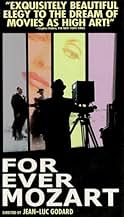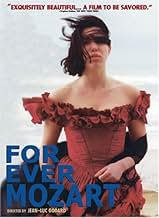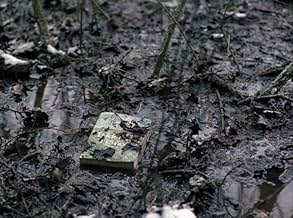For Ever Mozart
- 1996
- Tous publics
- 1h 24min
NOTE IMDb
6,1/10
1,2 k
MA NOTE
Film à la philosophie minimaliste sur les malheurs du monde et la crise du cinéma, de l'écriture, de l'art, où l'auteur se compare à un Mozart incompris.Film à la philosophie minimaliste sur les malheurs du monde et la crise du cinéma, de l'écriture, de l'art, où l'auteur se compare à un Mozart incompris.Film à la philosophie minimaliste sur les malheurs du monde et la crise du cinéma, de l'écriture, de l'art, où l'auteur se compare à un Mozart incompris.
- Récompenses
- 1 victoire et 2 nominations au total
Histoire
Le saviez-vous
- GaffesThe film director mistakenly refers to Henry Fonda as having been in She Wore A Yellow Ribbon.
- ConnexionsEdited into Histoire(s) du cinéma: Le contrôle de l'univers (1999)
Commentaire à la une
Watching For Ever Mozart reminds me after taking a bit of a break from seeing Jean-Luc Godard's films, in this case really more-so the later ones (eg 1980s till now) how sumptuous and thoughtful his films can be while he also becomes, perhaps, too impressed with his references, philosophical and political tangents, and with characters being more like models and mouth-pieces than anything extremely palatable. This time, unlike in a couple others by the director from this period, there is at least an attempt at setting up something for the characters to do, as opposed to being aimless amid Godard's own ramblings. The younger characters in their 20s are planning to do some sort of play in Sarajevo, a place where war has turned the country into hell (Godard would later in Notre Musique explore Sarajevo). There's also another story aligned with this where an old director, much as in other Godard works, is casting for a film, but is of course having trouble, not the least of which once he discovers one of his relatives (I think a relative, or a friend, I don't know whom) might be in harm's way or danger in Sarajevo.
For Ever Mozart isn't the most pretentious arm-pit that one who plunges deep into the director's cannon will eventually find all too well, and there were individual scenes that were striking, even funny. I thought it was fairly genius the scene where the director just keeps saying 'no, next' to the actors all just from saying two lines of dialog in an audition. Many of his outdoor compositions- sans the all-too-expected shots of the ocean which are as trademark for Godard as the demented profile close-up in a Kubrick film- are evidence of his gifts with the camera. Some of his compositions become even sort of awful, in a good way in its depiction I mean, of the material where the tanks and gun-shots and soldiers become more prominent in the 2nd half of the film. In a way it's a return to the kind of un-hinged anti-war film that Godard made in his earlier days with the near-masterpiece Les Carabiniers. There's even a considerable amount of on-screen violence, some of it punctuated with shots like a dead foot. There's also one scene particular, with more than a few references to obscene sexual talk in a casino, that had me grinning even if it had absolutely nothing to do with the rest of the film.
But with For Ever Mozart, for all of the parts that do work or seem somehow accessible, there are at least a few more than necessary that don't. It's all subjective, of course, and I'm sure those who decide to seek it out of Godard's oeuvre, which might not be many seeing the number of comments and votes on this site (and just critical response in general), may respond to it more than me. But the more interesting bits, those that may even not seem to be part of the usual mechanics of the unconventionality of his films, are sidelined by the self-consciousness, the references to everything from Camus to Rossellini. It's like Godard isn't content enough here to go completely with characters for us to really give a damn about or remember once the film ends (with the possible exception of the film director character) even if there is something of a story going on as one inter-cuts with another and another. There's some good ideas, and some tasteful music, going all abound in For Ever Mozart, but the lack of cohesion becomes staggering.
For Ever Mozart isn't the most pretentious arm-pit that one who plunges deep into the director's cannon will eventually find all too well, and there were individual scenes that were striking, even funny. I thought it was fairly genius the scene where the director just keeps saying 'no, next' to the actors all just from saying two lines of dialog in an audition. Many of his outdoor compositions- sans the all-too-expected shots of the ocean which are as trademark for Godard as the demented profile close-up in a Kubrick film- are evidence of his gifts with the camera. Some of his compositions become even sort of awful, in a good way in its depiction I mean, of the material where the tanks and gun-shots and soldiers become more prominent in the 2nd half of the film. In a way it's a return to the kind of un-hinged anti-war film that Godard made in his earlier days with the near-masterpiece Les Carabiniers. There's even a considerable amount of on-screen violence, some of it punctuated with shots like a dead foot. There's also one scene particular, with more than a few references to obscene sexual talk in a casino, that had me grinning even if it had absolutely nothing to do with the rest of the film.
But with For Ever Mozart, for all of the parts that do work or seem somehow accessible, there are at least a few more than necessary that don't. It's all subjective, of course, and I'm sure those who decide to seek it out of Godard's oeuvre, which might not be many seeing the number of comments and votes on this site (and just critical response in general), may respond to it more than me. But the more interesting bits, those that may even not seem to be part of the usual mechanics of the unconventionality of his films, are sidelined by the self-consciousness, the references to everything from Camus to Rossellini. It's like Godard isn't content enough here to go completely with characters for us to really give a damn about or remember once the film ends (with the possible exception of the film director character) even if there is something of a story going on as one inter-cuts with another and another. There's some good ideas, and some tasteful music, going all abound in For Ever Mozart, but the lack of cohesion becomes staggering.
- Quinoa1984
- 21 sept. 2006
- Permalien
Meilleurs choix
Connectez-vous pour évaluer et suivre la liste de favoris afin de recevoir des recommandations personnalisées
Détails
- Date de sortie
- Pays d’origine
- Site officiel
- Langues
- Aussi connu sous le nom de
- Моцарт навсегда
- Lieux de tournage
- Sociétés de production
- Voir plus de crédits d'entreprise sur IMDbPro
Box-office
- Montant brut aux États-Unis et au Canada
- 25 000 $US
- Montant brut mondial
- 25 000 $US
- Durée1 heure 24 minutes
- Mixage
- Rapport de forme
- 1.66 : 1
Contribuer à cette page
Suggérer une modification ou ajouter du contenu manquant

























